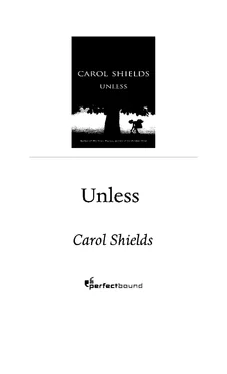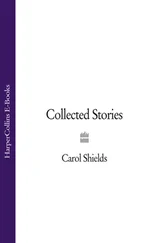Carol Shields - Unless
Здесь есть возможность читать онлайн «Carol Shields - Unless» — ознакомительный отрывок электронной книги совершенно бесплатно, а после прочтения отрывка купить полную версию. В некоторых случаях можно слушать аудио, скачать через торрент в формате fb2 и присутствует краткое содержание. Жанр: Современная проза, на английском языке. Описание произведения, (предисловие) а так же отзывы посетителей доступны на портале библиотеки ЛибКат.
- Название:Unless
- Автор:
- Жанр:
- Год:неизвестен
- ISBN:нет данных
- Рейтинг книги:4 / 5. Голосов: 1
-
Избранное:Добавить в избранное
- Отзывы:
-
Ваша оценка:
- 80
- 1
- 2
- 3
- 4
- 5
Unless: краткое содержание, описание и аннотация
Предлагаем к чтению аннотацию, описание, краткое содержание или предисловие (зависит от того, что написал сам автор книги «Unless»). Если вы не нашли необходимую информацию о книге — напишите в комментариях, мы постараемся отыскать её.
Unless — читать онлайн ознакомительный отрывок
Ниже представлен текст книги, разбитый по страницам. Система сохранения места последней прочитанной страницы, позволяет с удобством читать онлайн бесплатно книгу «Unless», без необходимости каждый раз заново искать на чём Вы остановились. Поставьте закладку, и сможете в любой момент перейти на страницу, на которой закончили чтение.
Интервал:
Закладка:
He suspects Danielle Westerman suffers from some long ago childhood trauma, that she, at eighty-five, still reverberates with an unrecognized shame or loss or sorrow of a highly specific sort.
Because Tom is a man, because I love him dearly, I haven’t told him what I believe: that the world is split in two, between those who are handed power at birth, at gestation, encoded with a seemingly random chromosome determinate that says yes for ever and ever, and those like Norah, like Danielle Westerman, like my mother, like my mother-in-law, like me, like all of us who fall into the uncoded female otherness in which the power to assert ourselves and claim our lives has been displaced by a compulsion to shut down our bodies and seal our mouths and be as nothing against the fireworks and streaking stars and blinding light of the Big Bang. That’s the problem.
This cry is overstated; I’m an editor, after all, and recognize purple ink when I see it. The sentiment is excessive, blowsy, loose, womanish. But I am willing to blurt it all out, if only to myself. Blurting is a form of bravery. I’m just catching on to that fact. Arriving late, as always.
Whence
January 10, 2001
Dear Peter (“Pepe”) Harding:
So! You’ve died. I read your obituary this morning in the Globe and Mail, while sitting in a sunny corner of my living room; you don’t even want to know what it’s like outside today; it’s so bad the weather report on the radio broke into poetry and called what we’re experiencing “bitter cold,” which sounds like a phrase from an ancient Anglo-Saxon epic.
There’s a bitter wind, too, meaner than a junkyard dog, as the old song has it.
Years ago I belonged to a small writing group, and the leader of our group, a woman called Gwen Reidman, advised us to read obituaries because they carry, like genes packed tight in their separate chromosomes, tiny kernels of narrative. These little yelps of activity — Gwen always referred to them as putty — are so personal and authentic and odd that they are able to reinforce the thin tissue of predictable fiction and bend it into unlikely shapes. I recently read an obit, for instance, of an elderly deceased woman who had been the 1937 lacrosse champion of Manitoba. Think of it: this was a woman who carried her triumph through the years of World War II, through the riotous sixties, through the long leadership era of Pierre Elliott Trudeau and Ronald Reagan and Margaret Thatcher, all the way into the late nineties, when her grandchildren acquired — I am guessing — a computer with access to the Internet, where they found, after some minutes of searching, a number of Web pages devoted to the nearly extinct game of lacrosse — and a mention of a name, their grandmother’s name, it was astonishing! — that name was still blinking out there in the detritus of time, a champion’s name, a victor.
I was sorry to read that you have struggled so long with your cancer, but “bravely,” as the report says, all the way to the end. What an interesting life you’ve led. I’m sure you didn’t dream growing up on a hardscrabble Saskatchewan farm that you would be awarded the Douglas McGregor Scholarship and end up in Toronto, a beloved teacher at the very private and elite Upper Canada College, and that you would always give your “utmost” to your students, so that when you retired in 1975 they got together and held a roast at Hart House, an event of such warmth and tribute that it is still talked about today. Kaye, your wife, will miss you, as will your children, Gayle and Ian, and your three grandchildren, and your old colleagues who visited you in hospital, sitting upright in those stiff, steel hospital chairs.
You were comforted in your last days, the obituary notice concludes, by that pile of books on your bedside table. You would not be parted from them. Mark Twain, Jack London, Sinclair Lewis, Fitzgerald, Hemingway, Faulkner, Joyce, Beckett, T. S. Eliot, Leonard Cohen — their texts constituted for you an “entire universe.” Another “entire universe” reached you through the earphones provided by the hospice and for which your family gives thanks: Bach, Beethoven, and Mozart; they sang you off to your death.
I am going through some bleak days, Mr. Harding, Pepe. (Difficult teenagers and so on, which you will know something about from your teaching years and from your own family.) I, too, am hungry for the comfort of the “entire universe,” but I don’t know how to assemble it and neither does the oldest of my children, a daughter. I sense something incomplete about the whole arrangement, like a bronze casting that’s split open in the foundry, an artifact destined by some invisible flaw to break apart. Also, I’m frightened that I’m missing something, that Norah is missing something.
Goodbye, rest in peace. Go well, as they say in Swaziland, where my friend Sally Bachelli spent a year teaching village women to make dresses for themselves. Four-hour dresses, they were called; that’s how long it took to make a dress without a sewing machine, Sally’s own design.
I grieve for you too.
Rita Hayworth
Orange Blossom City
Forthwith
“Reta!”
“Arthur.”
“I hope I’m not too terribly late. Traffic was a nightmare, and then the taxi got lost, thinking it was Orangeville I wanted, not Orangetown. It seems there’s a great difference.”
“About fifteen miles, it’s awfully confusing, but do come in out of the cold. Here, let me take your coat. I thought you’d be older somehow.”
“Thirty-nine. And you’re forty-four — I looked it up in the clipping file.”
“Almost contemporaries. But not quite.”
“What a heavenly house. Wood smoke, I can smell wood smoke. Ah, and there is the fire, the source of that heavenly aroma.”
“I thought we could sit —”
“There’s nothing like a wood fire. Crackling away. In New York only the fortunate few have access to — And the price of firewood! Ten dollars for four little sticks, of course that’s for very, very good firewood, hickory — What a splendid room this is, Reta — these lovely windows — Good God, it’s already getting dark — not even four-thirty — of course, you’re much further north — that would make the difference.”
“Would you like some coffee? I’ve just —”
“Coffee, hmm.”
“Or, since you’ve just got out of a cold taxi — maybe — it’s early, but maybe you’d like a glass of red wine.”
“I wouldn’t want you to open a bottle just for me.”
“I’m sure we have one open. I’ll just —”
“So this is where you work.”
“Well, not in this actual room. This is the living room. I have a little spot on the third floor that I —”
“Oh my!”
“I hope you’re not allergic to dogs.”
“No, I was just — just taken by surprise.”
“He’s entirely harmless, aren’t you, Pet — with an extremely obedient nature, though it took forever to get him housetrained. That’s what we call him. Pet.”
“And your family? They’re here at the moment.”
“The girls will be home in an hour or so. They’ve got swimming after school today. And my husband, Tom, he’ll be coming soon. We’re hoping you can stay to dinner, just a simple
—”
“I’d be delighted. Honoured to be welcomed so warmly. I don’t want to be a nuisance but — this view with the fading light, that hint of rose in the air behind the trees, it must be a source of calm and, well — I do hate the word inspiration, it’s grown to be such a cliché, but in this case I feel I can believe in such a thing, that living here, in such peace, these oaks and maples, the pace of each day quietly asserting itself — ah, thank you so much — the seasons rolling along — Hmm — a lovely light red, it’s never too early in the afternoon for a red like this. Let me propose a toast to the new manuscript — to Alicia and Roman! — and now, tell me, how is it coming?”
Читать дальшеИнтервал:
Закладка:
Похожие книги на «Unless»
Представляем Вашему вниманию похожие книги на «Unless» списком для выбора. Мы отобрали схожую по названию и смыслу литературу в надежде предоставить читателям больше вариантов отыскать новые, интересные, ещё непрочитанные произведения.
Обсуждение, отзывы о книге «Unless» и просто собственные мнения читателей. Оставьте ваши комментарии, напишите, что Вы думаете о произведении, его смысле или главных героях. Укажите что конкретно понравилось, а что нет, и почему Вы так считаете.












